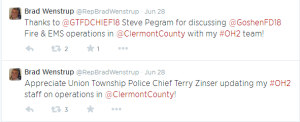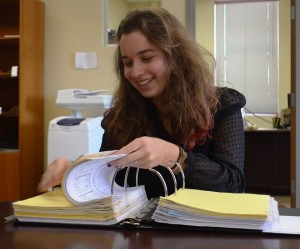Guest Blogger Miranda Romano ’16
I expected a long, hallway entrance lined with American flags; crests and red velvet curtains. At least high speed internet. But these were not the things that greeted me on my first day of work in the Congressman’s office. Instead, I stepped into a four room office nestled up in the annex of the local fire department. But the biggest surprise for me was not the physical office; it was the environment I was stepping into and how different I would find writing in this space compared to my work at school.
I have come to find that academic work is something of a selfish pursuit. Now, I don’t mean selfish in a derogatory way and I don’t mean that it is worthless and unnecessary. But I am quickly learning how different the work in a business atmosphere is from that in academic situations. I am so used to writing for myself. Usually I am writing “for” a professor, but in the end it is for my own progress. Whenever I step into this office, find myself in the company of these hard working people and the constantly jammed printer, my purpose changes. My clientele has grown incredibly, the importance of properly representing ideas has increased, and I have started to understand how vital it is to know the language and the context of a written piece of work.
This website gives interesting insight into the specifics of each work environment that interns perform in. It goes more in depth about what I have noted – how we are expected to successfully work in both places even though nearly every aspect is completely different.
A New Audience
When I say that my clientele has increased, I don’t mean just by a few people. I’m talking going from one professor to an entire district in the state of Ohio. From a single person to an entire population of Americans. The staffers in the office are somehow not fazed by this; just another day on the job. But I have to admit, I had no idea where to start. It’s hard enough to write to please one person, let alone thousands. To make the tasks I was set with seem less imposing, I began to think of everyone I came in contact with as a client or a customer. The point was simply to communicate effectively and to address their particular needs.
 I saw this especially whenever I went on outings with the field representatives. I traveled to a dozen or so fire and police stations, met chiefs and superintendents and ate lunch with trustees. And all the while, my job was to record their concerns so that they could be shared with the Congressman. In this way, we were directly working with the American people to address issues and communicate observations and concerns that would otherwise just sit in the general population. In school, if I don’t communicate properly or effectively, I risk only my grade. In this case, I risk failing my client, and by extension, the Congressman’s client. There cannot be miscommunications, because it would hinder the process of solving problems and addressing the concerns of Americans. This, in turn, makes the Congressman look bad. See what I mean about this no longer being a selfish endeavor?
I saw this especially whenever I went on outings with the field representatives. I traveled to a dozen or so fire and police stations, met chiefs and superintendents and ate lunch with trustees. And all the while, my job was to record their concerns so that they could be shared with the Congressman. In this way, we were directly working with the American people to address issues and communicate observations and concerns that would otherwise just sit in the general population. In school, if I don’t communicate properly or effectively, I risk only my grade. In this case, I risk failing my client, and by extension, the Congressman’s client. There cannot be miscommunications, because it would hinder the process of solving problems and addressing the concerns of Americans. This, in turn, makes the Congressman look bad. See what I mean about this no longer being a selfish endeavor?
Becoming Fluent in Real World Language
Along this same vein, it is even more important to write clearly and accurately to avoid miscommunications or misrepresenting anyone. In school, if something is incorrect or unclear, I can go to my professor and explain my thoughts and what I meant. It is much more difficult to explain something to the population of an entire district, some of which are looking for any reason to catch the Congressman in the wrong. My first week on the job, I began to learn the language of the office and the best way to communicate with both of our clients: the American people and the Congressman. It took a great deal of research to become well versed in some of the political jargon and I had to learn the best way to deal with frustrated constituents. There are particular ways for doing all of this. The staffers have it all down, having learned it over time while communicating with our clients. I am still learning, and I definitely do not think I am fluent in the lingo of the real world. But I have seen myself become more adaptable as a writer. And even though I said I wasn’t doing selfish writing, it’s been neat to see myself grow from this experience over the past few months.
If you would like to see examples of the kinds of documents I was working with, please feel free to check out this link: http://wenstrup.house.gov/news/
So What?
It is important for you, the student and intern, to realize the differences between writing in the classroom and writing out in the professional world. If writers go along as though nothing has changed and do not adapt to a new environment, they will definitely not be successful. It is vital to focus on the changes in audience and in purpose when transferring between academic and business writing. This is the best way to adapt to a new way of writing.
I’m sure many students, myself included, want to jump right in, assuming they have all of the tools necessary to please their new client and peers. This is not always a good thing to assume and when you find yourself in a strange place with an unfamiliar way of doing things, don’t be afraid to observe and to ask. Take a step back and decide what the office or group’s purpose is and how you will best serve them. In the beginning, every new opportunity is a learning experience as you gain confidence and understanding of how your new environment works. If you take the time to really analyze the inner workings of your new work space, you will find yourself more easily adapting your academically-acquired skills to your real world work place.


 Follow
Follow
One Comment
I completely understand what you mean! When I interned in Costa Rica, I was no longer writing for a grade. I had a different purpose, but no assignment sheet to make that purpose explicit. You did a great job of pointing out the need to recognize writing in an academic space versus writing in the “real world.”